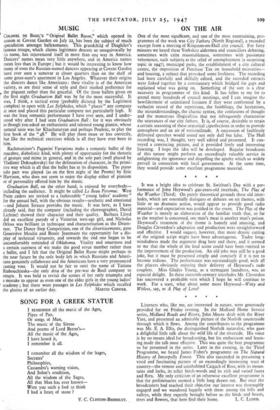COLONEL DE BASIL'S " Original Ballet Russe t " which opened its
season at Covent Garden on July 22, has been the subject of much speculation amongst balletomanes. This gr4ndchild of Diaghilev's famous troupe, which claims legitimate descent so unequivocally by its name, has rejuvenated itself in more than one way in America. Dancers' names mean very little anywhere, and in America names mean less than in Europe ; but it would be interesting to know how many of even the Russian-named dancers appearing at Covent Garden have ever seen a samovar at closer quarters than on the shelf of some great-aunt's apartment in Los Angeles. Whatever their origins the dancers dance like Americans : their vitality is of the American variety, as are their sense of style and their marked preference for the piquant rather than the graceful. Of the three ballets given on the first night Graduation Ball was by far the most successful. It was, I think, a tactical error (probably dictated by the Legitimist complex) to open with Les Syiphides, which " places' any company at once and placed this particular company not particularly high. It was the least romantic performance I have ever seen, and I under- stood why after I had seen Graduation Ball : for it was obviously as though you asked an enthusiastic and talented young pianist, whose natural taste was for Khachaturyan and perhaps Poulenc, to play the first book of the " 48." He will play them more or less correctly, but like the technical exercises which is all they have ever been to him.
Rachmaninov's Paggnini Variations make a romantic ballet of the macabre, diabolistic kind, with plenty of opportunity for the rhetoric of gesture and mime in general, and in the solo part (well played by Vladimir Dokoudovsky) for the delineation of character, in the primi- tive way which is all that the ballet has at its disposition. The piano solo part was played (as on the first night of the Proms) by Eric Harrison, who does not seem to enjoy the display either of pianism or of personality offered him by the music.
Graduation Ball, on the other hand, is enjoyed by everybody— including the audience.. It might be called Le Beau Potomac. West Point cadets are invited to a fashionable " young ladies' academy " for the annual ball, with the obvious results—aesthetic and emotional and Johann Strauss provides the music. It was here, as I have already said, that the company (including the choreographer, David Lichine) showed their character and their quality. Barbara Lloyd did an excellent parody of a Victorian teen-age girl, and Nicholas Orloss was brilliant in technique and characterisation as the Drum- mer. The Dance Step Competition, one of the divertissements, gave Genevieve Moulin and Renee Jeanmaire the opportunity for a dis- play of technical virtuosity, and towards the end one began to be uncomfortably reminded of Oklahoma. Vitality and smartness and a certain cuteness of wit make the good revue number rather than a ballet, and I felt that the Original Ballet Russe might perhaps in the near future be the only body left in which Russians and Ameri- cans genuinely collaborate and the Americans have a very pronounced casting vote. It would not be fair to omit the name of Tatiana Riabouchinska—the only diva of the pre-war de Basil company to return. It was bold to revisit the scenes of her early triumphs and a mistake to appear as even one of the elder girls in the young ladies' academy ; but there were passages in Les Sylphides which recalled
the glories of an earlier day. MARTIN COOPER.


































 Previous page
Previous page